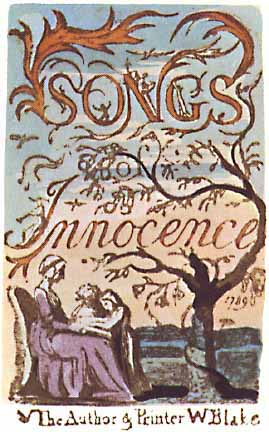Songs of Innocence
1. Introduction
Piping down the valleys wild
Piping songs of pleasant glee
On a cloud I saw a child.
And he laughing said to me.
Pipe a song about a Lamb;
So I piped with merry chear,
Piper pipe that song again—
So I piped, he wept to hear.
Drop thy pipe thy happy pipe
Sing thy songs of happy chear,
So I sung the same again
While he wept with joy to hear
Piper sit thee down and write
In a book that all may read—
So he vanish'd from my sight.
And I pluck'd a hollow reed.
And I made a rural pen,
And I stain'd the water clear,
And I wrote my happy songs
Every child may joy to hear
Questions
a. What difference does this have as an invocation in comparison with other regular ones? What does it tell you about the poet's unique intention?
b. Does the style of this poem tell you anything at all?
c. This surely contains a pastoral vision. Any unique aspect?
2. The Chimney Sweeper
When my mother died I was very young,
And my father sold me while yet my tongue
Could scarcely cry " 'weep! 'weep! 'weep! 'weep!"
So your chimneys I sweep & in soot I sleep.
There's little Tom Dacre, who cried when his head
That curled like a lamb's back, was shaved, so I said,
"Hush, Tom! never mind it, for when your head's bare,
You know that the soot cannot spoil your white hair."
And so he was quiet, & that very night,
As Tom was a-sleeping he had such a sight!
That thousands of sweepers, Dick, Joe, Ned, & Jack,
Were all of them locked up in coffins of black;
And by came an Angel who had a bright key,
And he opened the coffins & set them all free;
Then down a green plain, leaping, laughing they run,
And wash in a river and shine in the Sun.
Then naked & white, all their bags left behind,
They rise upon clouds, and sport in the wind.
And the Angel told Tom, if he'd be a good boy,
He'd have God for his father & never want joy.
And so Tom awoke; and we rose in the dark
And got with our bags & our brushes to work.
Though the morning was cold, Tom was happy & warm;
So if all do their duty, they need not fear harm.
Questions
a. A social criticism. In what sense?
b. The narrator's point of view, is it different from Tom Dacre's?
c. Is there any irony in the moral lesson at the ending?
Selections from Songs of Innocence and Experience.pdf Songs of Innocence and Experience


